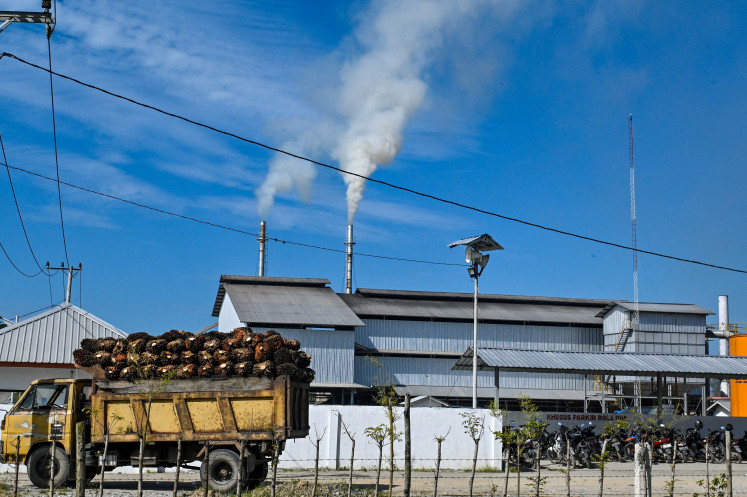Popular Reads
Top Results
Can't find what you're looking for?
View all search resultsPopular Reads
Top Results
Can't find what you're looking for?
View all search resultsUbud celebrates royal wedding
Wedded to tradition: Two couples undergo the mekalan-kalan ritual during a traditional wedding ceremony at the Puri Agung Ubud Palace in Bali on Friday
Change text size
Gift Premium Articles
to Anyone
W
span class="caption" style="width: 498px;">Wedded to tradition: Two couples undergo the mekalan-kalan ritual during a traditional wedding ceremony at the Puri Agung Ubud Palace in Bali on Friday. (JP/Anggara Mahendra)
Ubud, the little town in Gianyar famous for being a cultural mecca, was abuzz Friday as the influential royal family organized a lavish double wedding ceremony for two of its young princes.
Tourists and locals flocked to Puri Agung Ubud Palace from the early hours of the morning. The former wished to catch a glimpse of the ceremony while the latter brought gifts for the aristocratic family, who have succeeded in transforming their feudal legacy into an influential part of the island's contemporary political and business landscape.
The bridegrooms both came from illustrious bloodlines. Tjokorda Gde Agung Ichiro Sukawati is the son of Tjokorda Gde Putra Sukawati, a prominent businessman and the current penglingsir (elder) of the royal family, while Tjokorda Gde Dharma Sukawati is the son of Tjokorda Oka Artha Ardana Sukawati, the former regent of Gianyar and the current chairman of the Indonesian Hotels and Restaurants Association (PHRI) Bali chapter.
Ichiro married Cokorda Istri Julyana Dewi and Dharma tied the knot with Gusti Ayu Mahadewi. Both brides also hailed from noble families.
Locals from various banjar (traditional neighborhood associations) and desa pekraman (customary villages) around Ubud took turns over the last few days to help the royal family prepare for the weddings. Puri Agung Ubud, a top tourist attraction known for its elaborately carved rustic gates as well as classical Balinese dances performances, was sumptuously decorated with fresh flowers and coconut leaves. Dozens of bouquets sent by relatives and business associates lined the palace's outer wall.
The ceremony, which lasted the whole day, started in the morning with the mekalan-kalan ritual and ended in the afternoon with widi-widana.
'The mekalan-kalan ritual marks the bride and bridegroom's transition from brahmacari to grhasta and their official entrance into family life,' Tjokorda Oka Artha Ardana Sukawati said.
In Hindu teaching, brahmacari is the phase of life when a devotee is expected to commit his or herself to the pursuit of knowledge while grhasta is when building a family is the devotee's main obligation. The two last phases are wanaprasta, when the devotee should pursue a spiritual path and biksuka is when the devotee renounces all worldly attachments.
Mekalan-kalan also aims at presenting the bride and bridegroom before the butha saksi, the first witness, which comprises the universe, the natural forces and the unseen creatures. In the widi-widana ritual, the bride and bridegroom are brought before the dewa saksi, the third witness comprises the gods and ancestral spirits. The second witness is manusa saksi, comprising all relatives and guests at the ceremony.
During the mekalan-kalan ritual, the couples underwent a series of purification rites before participating in a enactment ' which saw the grooms carrying a coconut and some fruit and vegetables on a stick as a symbol of their commitment to his future family, while the brides lightly hit them with a broom, signifying their role as a motivator. The peak of the ritual took place when the grooms drew a kris and used it to pierce a rectangular sheet of woven leaves held by the bride, a symbolic act of consummating the marriage.
The mekalan-kalan ceremony was witnessed by many high priests and temple priests from across Bali. It was also witnessed by the grooms' parents, but the brides' parents were not allowed to witness the ritual.
The event continued with the widi-widana ceremony in the evening. The ritual was held in the Bale Agung open pavilion and officiated by two high priests.
'The widi-widana ritual seeks blessing from God,' Cok Ace said.
After the widi-widana ritual, the brides and groom were taken on open wooden palanquins in a parade from the palace to Merajan Agung, the royal family ancestral temple.
The ceremony was attended by scores of dignitaries, including Deputy Bali Governor Ketut Sudikerta and Buleleng Regent Putu Agus Suradnyana. Golkar Party chairman Aburizal Bakrie was seen arriving at the palace's gate at around 6 p.m.
The mapejati ritual, which is when the grooms pray at the brides' family temple, will be held on Saturday and Sunday. The last ritual, megat jalan, will be held on Monday. After the completion of megat jalan, the couples will be allowed to travel outside the palace compound.
On Saturday, Mapejati will be held in Puri Anyar, the royal family house of Cokorda Istri Julyana Dewi and the next day it will be at Puri Kedisan, the royal family house of Gusti Ayu Mahadewi.










